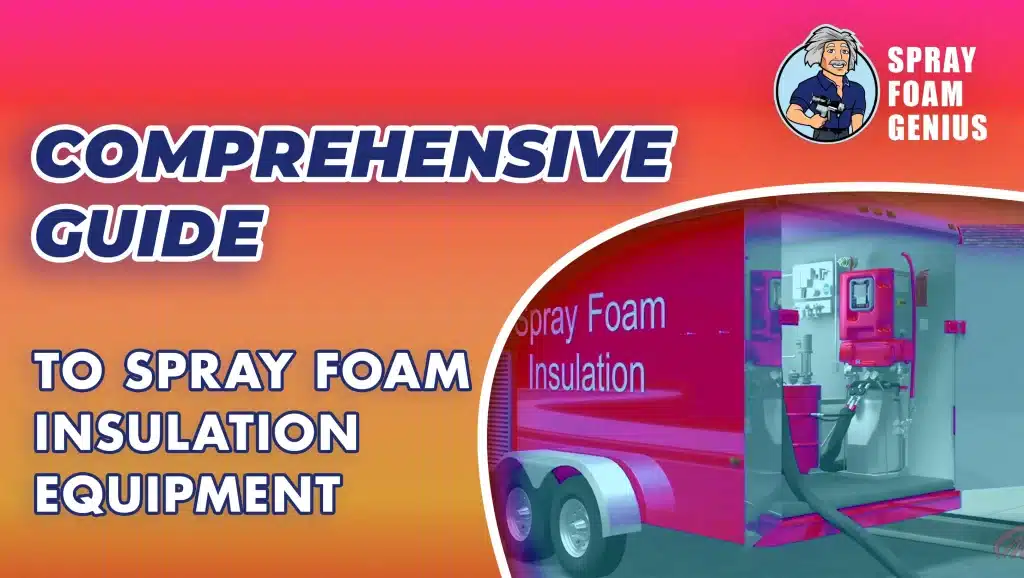
Spray foam insulation has revolutionized the way we approach energy efficiency and thermal insulation in both residential and commercial properties. Its effectiveness in sealing gaps, reducing energy bills, and improving overall comfort is unmatched by traditional insulation materials. At Spray Foam Genius Marketing, we’re dedicated to supporting spray foam insulation contractors with top-notch SEO, local marketing, and lead generation services. Understanding the equipment used in spray foam insulation is crucial for anyone involved in the industry, whether you’re a contractor or a homeowner considering a project. This comprehensive guide explores the essential spray foam insulation equipment, helping you make informed decisions and optimize your application process.
Essential Components of Spray Foam Insulation Equipment
Spray foam insulation involves a specific set of equipment designed to mix and apply the foam efficiently. The key components of spray foam insulation equipment include:
1. Spray Foam Machines
Types of Spray Foam Machines:
- Air-Purged Systems: These systems use compressed air to mix and spray the foam. They are ideal for smaller, residential applications due to their user-friendly nature and cost-effectiveness. Air-purged systems are known for their simplicity and ease of operation, making them a popular choice for many contractors.
- Hydraulic Systems: Hydraulic systems utilize hydraulic pressure to mix and spray the foam. They are more suited for large-scale commercial or industrial projects where high output and consistent performance are required. These systems offer robust performance and reliability, making them suitable for continuous use over long periods.
Key Features to Consider:
- Output Capacity: The output capacity of a spray foam machine is measured in pounds per minute. Higher output capacities are essential for larger projects where you need to apply large quantities of foam quickly and efficiently.
- Heat Control: Effective heat control mechanisms are crucial for maintaining the foam components at the optimal temperature. This ensures that the foam cures properly and achieves the desired insulation properties.
- Mixing Efficiency: A machine’s mixing efficiency affects the consistency of the foam. Proper mixing is vital for achieving uniform insulation and ensuring that the foam performs as expected.
2. Hoses and Guns
Types of Hoses:
- Heated Hoses: Heated hoses are designed to maintain the temperature of the foam during application. They are particularly important in colder climates where the temperature can affect the foam’s performance. Heated hoses help prevent the foam from becoming too viscous or curing prematurely.
- Standard Hoses: Standard hoses are suitable for warmer climates where temperature control is less critical. They are generally more cost-effective but may not provide the same level of performance in extreme conditions.
Types of Guns:
- Single Component Guns: These guns are used with single-component foams. They are easier to operate and maintain, making them a good choice for simpler applications. Single-component guns are less versatile compared to their plural-component counterparts.
- Plural Component Guns: Plural component guns are used with two-component foams, offering more precise mixing and application control. They are ideal for professional-grade applications and complex projects requiring high performance.
3. Mixing Equipment
Types of Mixers:
- Static Mixers: Static mixers are integrated into the spray gun and are responsible for blending the foam components as they are dispensed. They ensure a consistent foam mixture, which is essential for effective insulation.
- Dynamic Mixers: Dynamic mixers are used with separate mixing stations and offer thorough blending of foam components before application. They are typically used in larger operations where precise mixing is critical.
4. Protective Gear
Safety Gear Includes:
- Respirators: Respirators protect against inhaling harmful chemicals and fumes produced during the spray foam application process. Proper respiratory protection is crucial for ensuring the health and safety of the applicator.
- Gloves: Gloves shield the hands from exposure to foam chemicals, which can cause skin irritation or burns. High-quality, chemical-resistant gloves are essential for protecting against potential hazards.
- Goggles: Goggles prevent eye irritation and injury from foam particles and chemicals. They are a necessary part of personal protective equipment (PPE) when working with spray foam insulation.
Choosing the Right Equipment for Your Needs

Selecting the appropriate spray foam insulation equipment involves evaluating several factors to ensure that it meets your specific requirements. Here’s how to make an informed choice:
1. Project Size and Scope
The size and scope of your project play a significant role in determining the right equipment. For small residential projects, a basic air-purged system might be sufficient. For larger commercial or industrial projects, hydraulic systems with higher output capacities and advanced features are more suitable. Matching the equipment to the project size helps optimize efficiency and performance.
2. Climate Conditions
Climate conditions impact the effectiveness of spray foam insulation equipment. In colder climates, heated hoses, and advanced temperature control features are essential to prevent issues with foam application. In warmer climates, standard equipment may suffice, as temperature control is less critical. Consider the climate of the area where the equipment will be used to ensure optimal performance.
3. Budget Considerations
Budget is an important factor when selecting spray foam insulation equipment. High-quality equipment often comes with a higher initial cost but can offer better performance, durability, and efficiency in the long run. Weigh the benefits of investing in advanced equipment against your budget constraints to make the best decision for your needs.
4. Ease of Use and Maintenance
Choose equipment that is user-friendly and easy to maintain. Equipment with straightforward controls and low maintenance requirements can save time and reduce operational costs. Regular maintenance is crucial for extending the lifespan of your equipment and ensuring consistent performance.
Maintenance and Care for Spray Foam Insulation Equipment
Proper maintenance is essential for keeping spray foam insulation equipment in optimal working condition. Here are some key maintenance practices:
1. Regular Cleaning
Clean the equipment thoroughly after each use to prevent foam buildup and clogs. Follow the manufacturer’s cleaning instructions to ensure that all components are properly cleaned and maintained. Regular cleaning helps prevent issues and extends the life of the equipment.
2. Routine Inspections
Conduct regular inspections to identify any wear and tear or potential issues. Check hoses, guns, and mixing components for signs of damage or malfunction. Addressing minor issues before they become major problems can save time and money in the long run.
3. Temperature Control
Ensure that temperature control mechanisms are functioning correctly. Regularly calibrate and test temperature settings to maintain the optimal conditions for foam application. Proper temperature control is critical for achieving the desired foam properties.
4. Storage
Store equipment in a clean, dry place to protect it from environmental factors that can cause damage. Proper storage conditions, such as keeping equipment away from extreme temperatures and moisture, help preserve its functionality and extend its lifespan.
Conclusion
Spray foam insulation is a highly effective solution for improving energy efficiency and comfort in buildings. Understanding the various types of spray foam insulation equipment and their features is essential for achieving the best results. By selecting the right machines, hoses, guns, and mixing equipment, and by adhering to proper maintenance practices, you can ensure optimal performance and longevity of your equipment.
At Spray Foam Genius Marketing, we are committed to supporting spray foam insulation contractors with our specialized digital marketing services. Whether you need assistance with SEO, lead generation, or reputation management, we are here to help.
Contact us today at 877-840-FOAM for USA and 844-741-FOAM for Canada visit our website at sprayfoamgeniusmarketing.com, or email us at [email protected] to learn more about how we can assist your business in thriving in the competitive spray foam insulation industry.
- Social Media Marketing for Spray Foam Businesses: What Works in 2025? - February 6, 2025
- Best SEO Strategies for Spray Foam Insulation Contractors to Rank #1 on Google - February 6, 2025
- What is Spray Foam Insulation? Benefits and Applications - February 5, 2025

